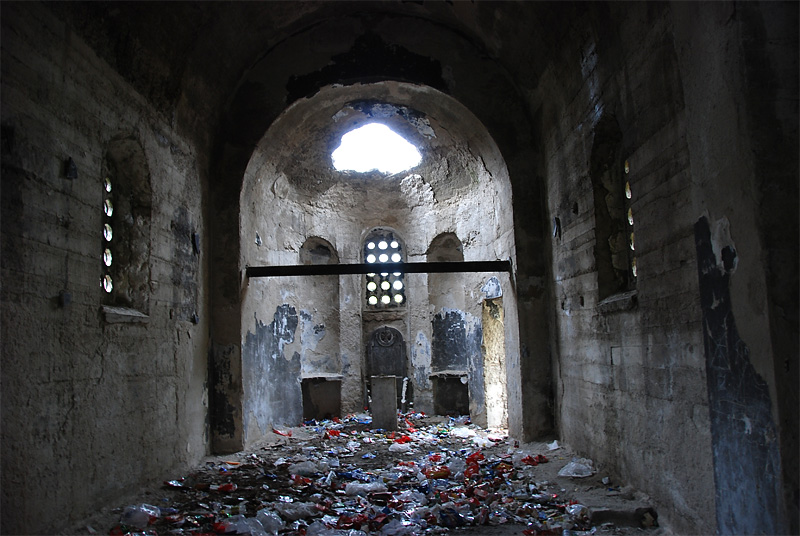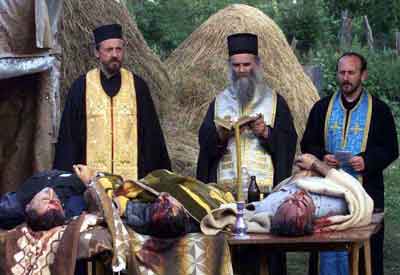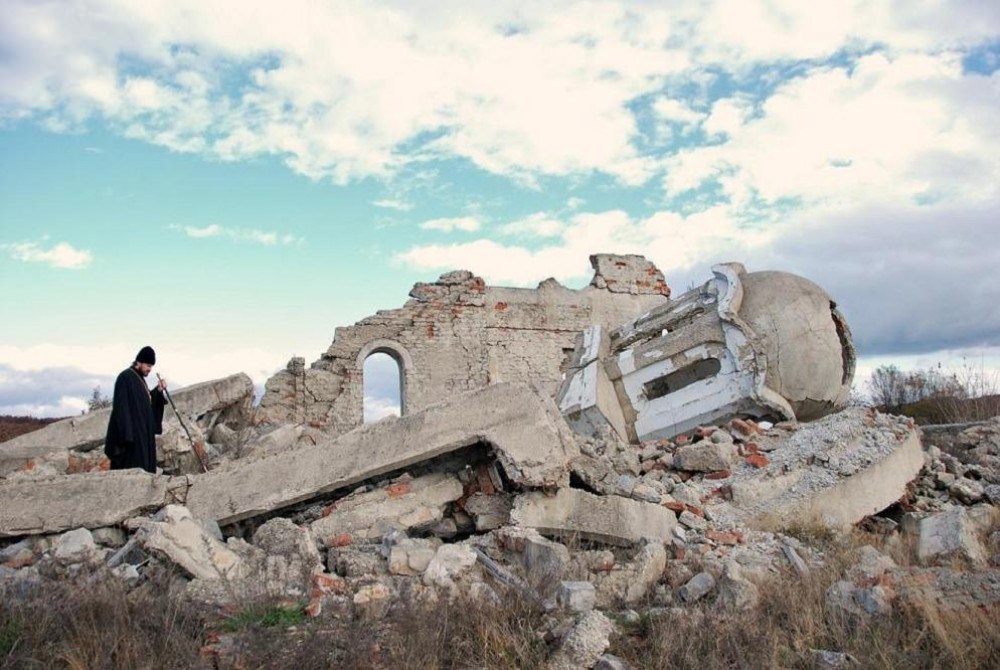
Destruction of Serbian Christian Orthodox heritage in Kosovo by Muslim Albanians
Views: 1668
Recent episodes of ethnic intolerance against the Serbian minority exacerbate conditions in a country which is increasingly an “Islamic island” in the heart of Europe.
Kosovo is once again the centre of attention in Orthodox Church circles. In addition to new instances of intolerance against the ethnic Serbian minority, recent actions taken by Russian Patriarch Kirill and Archimandrite Tikhon (Shevkunov), abbot of the Moscow monastery of Sretensky Stavropegic, have drawn attention.
Violence against Orthodox Serbs is growing: unsurprisingly, some of them speak openly of cultural genocide. Approximately one hundred and fifteen churches were destroyed or severely damaged during the Albanian attacks, and t wenty cemeteries were severely desecrated. Places of worship that had been razed to the ground included some buildings dating from the 12th to the 14th centuries. Meanwhile, on 9 March, the European Union spoke of the need to protect the cultural heritage represented by the Serbian monasteries in Kosovo, which are included on the list of the five most important sacred places of the Mediterranean along with Jerusalem, the Vatican, Mecca, and Mount Athos. EU President Jose Barroso explained that this statement makes it necessary to adopt an international document establishing a special level of protection of Orthodox sites in Kosovo.
wenty cemeteries were severely desecrated. Places of worship that had been razed to the ground included some buildings dating from the 12th to the 14th centuries. Meanwhile, on 9 March, the European Union spoke of the need to protect the cultural heritage represented by the Serbian monasteries in Kosovo, which are included on the list of the five most important sacred places of the Mediterranean along with Jerusalem, the Vatican, Mecca, and Mount Athos. EU President Jose Barroso explained that this statement makes it necessary to adopt an international document establishing a special level of protection of Orthodox sites in Kosovo.
Up to now, the Republic of Kosovo has proclaimed itself to be multi-ethnic, but the reality is quite different. In fact, the region appears more and more like an Islamic island in the heart of Europe, where many Arab states have been directing their ambitions. Saudi Arabia, for example, has established the Saudi Committee for Kosovo, in addition to the Arabic language centre al-Haramain. Bahrain founded the company El-Asla in Kosovo, as well as numerous centres for “Muslim youth” and educational institutions focused on the Koran; and Sudan has done the same with the World Association of Muslim Youth – not to mention the fifty mosques financed by the United Arab Emirates. Aggravating the reconciliation process (as reported by the New York Times) is a Paris-based investigative commission, which, at the beginning of January, after two years of work, completed a report to the European Council which stated that Kosovo President Hashim Thaci was head of the Drenica terrorist group, specializing in the trafficking of heroin and organs taken from Serbian prisoners executed during the 1999 conflict.
York Times) is a Paris-based investigative commission, which, at the beginning of January, after two years of work, completed a report to the European Council which stated that Kosovo President Hashim Thaci was head of the Drenica terrorist group, specializing in the trafficking of heroin and organs taken from Serbian prisoners executed during the 1999 conflict.
The most recent tensions to emerge demonstrate that the situation in Kosovo is far from peaceful. On 3 March, the 19th-century church of Saint George in the village of Stanišor was subjected to yet another theft from the parish coffers; the criminals damaged an icon while destroying the protective glass, and broke one of the crosses kept in the church. The desecration and theft at Stanišor took place after violent protests by Albanian Muslims against the 6 January arrival of Serbian President Boris Tadic at the historical monastery of Decani for Christmas celebrations; an enormous number of policemen had been deployed around the site. Moreover, in recent times, the possibility that the three Serbian-majority areas in the north of Kosovo will be politically reunited with Serbia seems to be gaining ground, given the extreme institutional disorder they have been heading into. The European Union actually spoke out against secession, proclaiming the cultural importance and necessary defence of Orthodox places of worship in the region and saying it was interested in “preserving Serbian identity in Kosovo.” In fact, the EU is one of the few states that recognize the national sovereignty of the region and, along with Great Britain and the United States, has supported the establishment of the Kosovan State by supporting and defending Albanians persecuted by Milosevic.
But a possible indicator of discontent with Serbia itself by the Orthodox minority in Kosovo must be noted – many Kosovan Serbs feel Belgrade’s position is overly soft: to avoid causing international controversy, it does not support Serbian secession. Last November, in fact, 21,000 Kosovan Serbs requested Russian citizenship from the Duma. This is where recent statements from Church authorities in Moscow enter the field of play. On 29 January, a Serbian newspaper published a lengthy interview with the Patriarch of Moscow and Russia – Kirill. “Serbs living in Kosovo and Metohija,” said Kirill, “have become hostages of an enormous political game.” “The Russian Federation,” said the patriarch, “has given considerable support to the Serbs of Kosovo: because of a decision by Russian authorities, UNESCO has allocated funds for the recovery of places of worship.” Kirill also spoke of the role of the Holy See: “The Pope of Rome, Benedict XVI, as he is known, has taken the correct position on the case. The Vatican has not yet decided to recognize Kosovo as an independent state. The Pope has always supported the need to defend the rights of the Serbian minority” (Source: Vaticaninsider).
According to the data from the Serbian Orthodox Church, nearly 150 churches and monasteries have been destroyed for the last five years in Kosovo.
Originally published 2012-04-01
Author: Keith Davies
Source: Rescue Christians
Origins of images: Facebook, Twitter, Wikimedia, Wikipedia, Flickr, Google, Imageinjection & Pinterest.
Read our Disclaimer/Legal Statement!
Donate to Support Us
We would like to ask you to consider a small donation to help our team keep working. We accept no advertising and rely only on you, our readers, to keep us digging the truth on history, global politics and international relations.
FOLLOW US ON OUR SOCIAL PLATFORMS









